- Clone
- A17024A (See other available formats)
- Regulatory Status
- RUO
- Other Names
- Mammalian target of rapamycin, FRAP, RAFT
- Isotype
- Mouse IgG1, κ
- Ave. Rating
- Submit a Review
- Product Citations
- publications
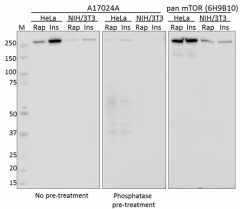
-

Whole cell extracts (15 µg protein) from serum starved HeLa and NIH/3T3 cells treated with 10 µM rapamycin (Rap) for 2 hours or with 150 nM insulin (Ins) for 6 minutes were resolved by 4-12% Bis-Tris gel electrophoresis, transferred to a nitrocellulose membrane, and probed with 0.5 µg/mL (1:1000 dilution) of purified anti-mTOR Phospho (Ser2448), clone A17024A, for 2 hours at room temperature. To confirm phospho-specificity of A17024A, a duplicate membrane was pre-treated with lambda protein phosphatase prior to incubation with A17024A. Proteins were visualized by chemiluminescence detection using HRP goat anti-mouse-IgG (Cat. No. 405306) at a 1:3000 dilution. Equal mTOR loading was confirmed by probing membranes with an anti-pan mTOR antibody (Cat. No. 659202) at 1.0 µg/mL (1:500 dilution). Lane M: Molecular Weight Marker. -

Serum starved HeLa cells treated with 150 nM insulin for 6 minutes were fixed with 4% paraformaldehyde for 10 minutes, permeabilized with ice-cold methanol for 10 minutes, and blocked with 5% FBS for 60 minutes. Cells were then intracellularly stained with a 1:100 dilution (5 µg/mL) of either mouse IgG (panel A) or purified anti-mTOR Phospho (Ser2448) antibody (panel B) for two hours at room temperature, followed by incubation with Alexa Fluor® 594 goat anti-mouse IgG (Cat. No. 405326) at 2.0 µg/mL. To confirm phospho-specificity of A17024A, fixed cells pre-treated with lambda protein phosphatase prior to staining were included as a control (panel C). Nuclei were counterstained with DAPI, and the image was captured with a 60X objective.
| Cat # | Size | Price | Quantity Check Availability | Save | ||
|---|---|---|---|---|---|---|
| 610301 | 25 µg | 90€ | ||||
| 610302 | 100 µg | 212€ | ||||
mTOR is a member of the PI3 family of kinases and plays a critical role in regulating cell proliferation and metabolism in response to nutrient availability, cellular energy status, hormones, growth factors, and stress. mTOR is found as a component of two functionally distinct oligomeric complexes, mTORC1 and 2 (mTOR complex 1 and 2). mTORC1 coordinates nutrient availability with cell growth and proliferation through phosphorylation of upstream regulators of proliferation and ribosomal biogenesis including eIF4BP1 and RPS6KB1 and RPS6KB2. Additionally, mTORC1 contols autophagy through negative regulation of an autophagy-promoting kinase complex comprised of ULK1, ATG13, and FIP200. mTORC2 regulates proliferation and metabolism via phosphorylation of IG-1R, InsR, and Akt, and also plays a role in cytoskeletal architecture and reorganization through modification of Rac1.
The mTOR subunit of mTORC1 and 2 is phosphorylated at Ser2448 in a PI3/Akt- signaling-dependent manner; this post-translational modification is associated with increased mTORC activity.
Product Details
- Verified Reactivity
- Human, Mouse
- Antibody Type
- Monoclonal
- Host Species
- Mouse
- Formulation
- Phosphate-buffered solution, pH 7.2, containing 0.09% sodium azide.
- Preparation
- The antibody was purified by affinity chromatography.
- Concentration
- 0.5 mg/ml
- Storage & Handling
- The antibody solution should be stored undiluted between 2°C and 8°C.
- Application
-
WB - Quality tested
ICC - Verified - Recommended Usage
-
Each lot of this antibody is quality control tested by Western blotting. For Western blotting, the suggested use of this reagent is 0.1 - 1.0 µg per ml. For immunocytochemistry, a concentration of 5 μg/ml is recommended. It is recommended that the reagent be titrated for optimal performance for each application.
- Application Notes
-
Based off complete sequence homology of the immunizing peptide, this clone is predicted to recognize both mouse and rat mTOR phosphorylated at serine 2448.
NIH/3T3 cells (murine origin) used in this experiment contain less mTOR than the human-derived HeLa cells (see pan mTOR blot). Thus, the reduced signal observed in these lysates is due to less total mTOR and not a decreased affinity of this clone for mouse mTOR phosphor (Ser2448). - Product Citations
-
- RRID
-
AB_2801105 (BioLegend Cat. No. 610301)
AB_2801106 (BioLegend Cat. No. 610302)
Antigen Details
- Structure
- mTOR is a 2,549 amino acid protein with a predicted molecular weight of ~289 kD.
- Distribution
-
Ubiquitously expressed; cytsosolic, lysosomal, and nuclear cellular localization
- Function
- Regulates cell proliferation and metabolism
- Interaction
- Part of the mammalian target of rapamycin complex 1 (mTORC1) which contains MTOR, MLST8, RPTOR, AKT1S1/PRAS40, and DEPTOR; also part of the mammalian target of rapamycin complex 2 (mTORC2) which contains MTOR, MLST8, PRR5, RICTOR, MAPKAP1, and DEPTOR.
- Biology Area
- Cell Biology, Cell Motility/Cytoskeleton/Structure, Cell Proliferation and Viability, Protein Synthesis, Signal Transduction
- Molecular Family
- Phospho-Proteins, Protein Kinases/Phosphatase
- Antigen References
-
- Brown EJ, et al. 1994. Nature. 369:756-8.
- Dennis P, et al. 2001. Science. 294:1102.
- Fingar D, et al. 2002. Genes Dev. 16:1472.
- Nojima H, et al. 2003. J. Biol. Chem. 278:15461.
- Gene ID
- 2475 View all products for this Gene ID
- UniProt
- View information about mTOR Phospho Ser2448 on UniProt.org
Related FAQs
Other Formats
View All mTOR Phospho (Ser2448) Reagents Request Custom Conjugation| Description | Clone | Applications |
|---|---|---|
| Purified anti-mTOR Phospho (Ser2448) | A17024A | WB,ICC |
Customers Also Purchased
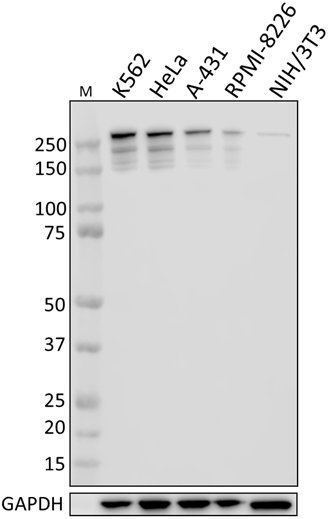
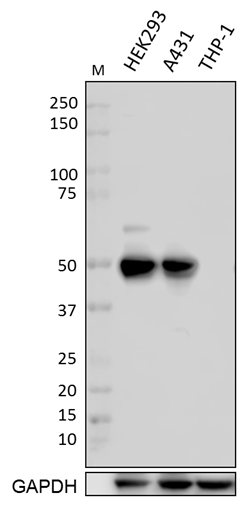
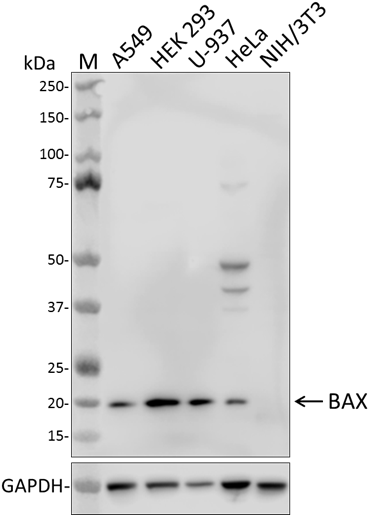
Compare Data Across All Formats
This data display is provided for general comparisons between formats.
Your actual data may vary due to variations in samples, target cells, instruments and their settings, staining conditions, and other factors.
If you need assistance with selecting the best format contact our expert technical support team.
-
Purified anti-mTOR Phospho (Ser2448)
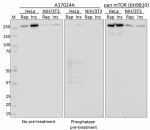
Whole cell extracts (15 µg protein) from serum starved HeLa ... 
Serum starved HeLa cells treated with 150 nM insulin for 6 m...
 Login / Register
Login / Register 




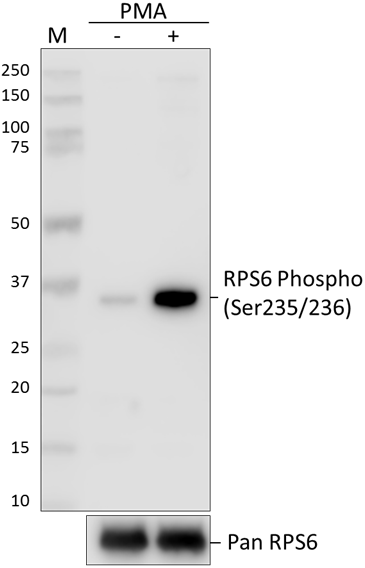



Follow Us